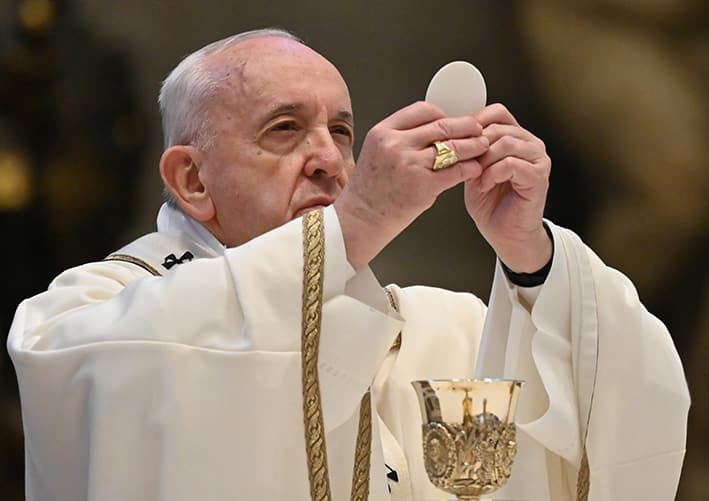
Feeling guilty about not feeling devastated without Mass?
It’s been a long, dry spell. Many Catholics have never gone this long without receiving the Eucharist since before their first communion.
Now that more and more parishes are finding ways to safely offer public Mass or some form of communion service, many Catholics are taking to social media to describe what an overwhelming emotional experience it has been for them. Some are even sharing photos of themselves with tear-stained cheeks, overcome with emotion after receiving communion again.
Some…are overcome with emotion after receiving communion again.
Much of this emotional response is surely sincere, a spontaneous outpouring of joy and gratitude after a time of trial and deprivation. It’s understandable to want to share our delight in the Lord with people who will understand.
So let’s set aside the question of how spiritually healthy it is to take and share selfies of pious displays, and look instead to Catholics who aren’t coming to pieces over the opening of churches.
There are a lot of them. There are a lot of Catholics who most certainly want to return to the sacraments, but they aren’t feeling wracking pangs of longing as their separation continues.

They aren’t spending their days in misery and distress, ceaselessly imploring the Holy Spirit to open the church doors again. And when they do receive the Eucharist again after a long time away, they aren’t going boneless with spiritual bliss. They believe in the saving power of God with all their hearts, but they’re not getting very emotional about it.
I’m here to tell you that, if that’s how it is for you, it’s okay. It doesn’t prove there’s something inferior about your faith. It doesn’t mean you’re lukewarm or spiritually mediocre. It doesn’t mean you don’t care about the sacraments, and it doesn’t mean you don’t understand how precious they are. It might mean any number of things, but it’s certainly not automatically a sign that you’re the wrong kind of Catholic.
Emotions are just emotions. They are not nothing, but they are not the same as faith.
a lot of Catholics most certainly want to return to the sacraments, but they aren’t feeling wracking pangs of longing
Sometimes emotions come to us unbidden from the Holy Spirit. Sometimes they are given to us as a gift. But sometimes they are not, and there are any number of reasons why this may be so. Sometimes the emotions that flood us have to do with 99 other, secondary things, and very little to do with the thing they appear to be attached to. Emotions are not the same as faith, and to confuse the two is foolish and dangerous.
Just think: If strong emotions always signaled strong faith, then the world would look very different, wouldn’t it? Christ felt intense emotions on the Cross, but surely so did Adam and Eve when they reached for the fruit.
Not all Catholics feel an ’emotional’ at the Eucharist and that’s ok
It’s a funny thing. Many Catholics can easily (and rightly) identify as shallow a faith that depends on strobe lights, fog machines, amplifiers, and sweating, throbbing, spontaneous emotive worship services. And yet when a very similar surge of emotion washes over them when they return to Mass, they imagine it’s a sign that their faith is immense — or worse, that there’s something puny in the faith of Catholics who don’t feel that emotional wave, but who had been stolidly, patiently waiting as long as the bishop said to wait, and who simply quietly, reverently, faithfully receive the Eucharist when they can.
Here’s a thought: It’s even possible that a lack of a flood of emotion shows a spiritual maturity. St. John of the Cross says that we shouldn’t expect or depend on spiritual consolations any more than a growing child who’s ready for solid food should depend on his mother’s milk.
It’s a fine line. Emotions aren’t meaningless, and they aren’t something to despise. Our bodies and our minds and our hearts are really us, and emotions aren’t just foolish effervescence. They can bring true pleasure or true pain, and they can point us to true things. Sometimes the Holy Spirit gives us the gift of intense emotions along with an act of faith. When they come, it’s normal and reasonable to try to understand what they mean — or just to enjoy them without fighting or over-analysing them.

But it’s also true that sometimes the Holy Spirit doesn’t give us the gift of intense emotions. Often, even. It’s a mistake to try to induce faith-related emotions in ourselves, thinking that we don’t really love God if we don’t feel what everyone else appears to be feeling. That limits the faith to something transient and physical, when it should be so much more.
What’s more, strong emotion, and confusing it for faith, can easily lead us astray. The restrictions related to the pandemic are revealing how many people don’t know the difference between strong emotions, like longing and fear and frustration and anger, and actual virtues, like strength and courage and faith.
Look at the centurion with the dying servant
Recall the centurion in the gospel of Matthew. When his servant needed healing, Jesus asked him if he wanted him to come to his house. But he told Jesus, “I am not worthy that you should come under my roof.” He knew that Jesus could heal his servant because of who he was, and he acknowledged as much to him. And that was it. There was his faith: He knew that Jesus was God and that he could heal the servant if he wanted to. Matthew says that Jesus was “amazed” by his faith.
If Jesus did come right up close into his actual house, it would have been an intensely emotional experience for everyone there–a joyful, overwhelming thing to happen. But it wasn’t necessary for him to go there, and the centurion knew it. Jesus could heal right from where he was. That’s what faith looks like: Not getting Jesus to go where we want him to go and making him feel what we want to feel, but just knowing that Jesus is who is is, and does what he wants.
So when we return to the Eucharist, it would be good to pray the words of the centurion: “Lord, I am not worthy that you should enter under my roof, but only say the word, and my soul shall be healed.”
If the experience does hit us right in our emotions, then let’s receive that experience with gratitude and humility. If it doesn’t, then nothing changes: Jesus is still there, still able to heal, still himself. We can amaze him with our faith when we accept this truth, even if it doesn’t come with a flood of tears.
